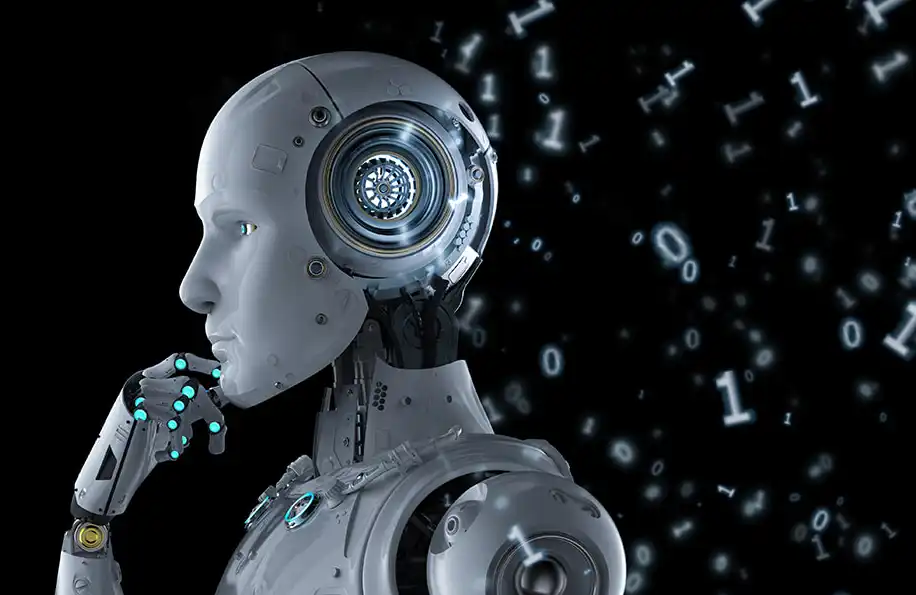Trump is going to open his own casino
How the Trump family is reshaping prediction markets and the boundaries of information.
Editor | Kaori
On October 28, Trump Media & Technology Group announced the launch of a prediction market product called "Truth Predict" on its social platform Truth Social. The company CEO stated in a press release that this platform aims to get more people involved in information judgment or prediction, allowing people not just to voice opinions, but to validate their judgments by placing bets.
This marks the Trump family's third major move in the prediction market sector.
As early as January 2025, Donald Trump Jr. joined the regulated prediction platform Kalshi as a strategic advisor.
In August of the same year, his venture capital firm 1789 Capital led a new round of financing for Kalshi's main competitor—crypto prediction market Polymarket. The latter is a platform that once received investment from ICE, the parent company of the New York Stock Exchange, and was valued at up to 9 billions USD. After the deal, Donald Trump Jr. also joined its advisory board.
A single family holding key positions in three core companies within the same track is highly unconventional in traditional venture capital logic.
Chris Perkins, managing partner at CoinFund, commented: "From a VC perspective, we generally don't invest in competing projects; we want to bet on the ultimate winner."
Clearly, the Trump family does not care about these conventional logics. What they want is not victory, but certainty.
The prediction market is at a critical point of explosion. According to a research report by investment management firm Certuity, by 2035, the industry will reach a scale of 95.5 billions USD, with a compound annual growth rate as high as 46.8%. Currently, Polymarket and Kalshi control over 96% of the market share.
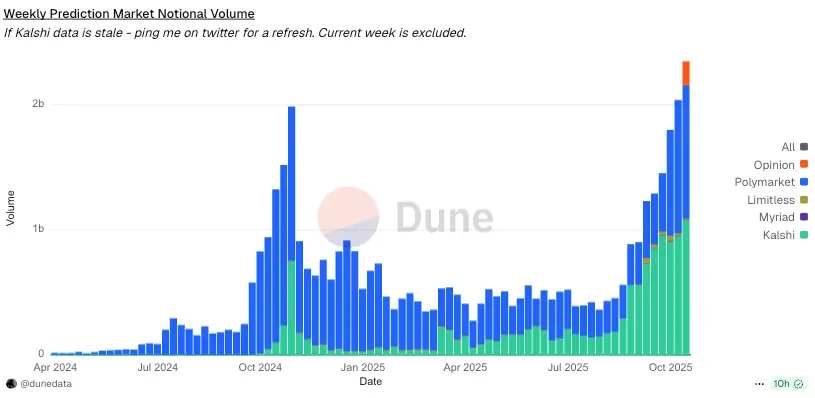
Market share of mainstream prediction market platforms | Source: Dune
The charm of this new track lies in the fact that, for the first time, "information" itself is openly priced and can be freely traded in the market. During the 2024 US election, such platforms were even praised by several media outlets as being more sensitive and having more "truth engine" potential than traditional polls.
Because in prediction markets, prices are not just statistical figures, but the result of thousands of people betting real money, reflecting people's judgment of event trends in real time better than questionnaires.
But when power and information begin to be controlled by the same group of people, this market, which claims to aggregate "collective wisdom," may no longer be gathering the truth, but rather a carefully designed illusion.
Revelry in a Regulatory Vacuum
The story of Polymarket is key to understanding the entire prediction market industry. In 2022, this then-prominent platform was identified by the US Commodity Futures Trading Commission (CFTC) as an "unregistered derivatives trading market," fined 1.4 millions USD, and required to stop providing services to US users.
A few days later, Polymarket announced the implementation of geo-blocking, officially exiting the US market.
November 2024, on the eve of the US election. In the early morning in Brooklyn, a team of federal agents knocked on the door of Polymarket CEO Shayne Coplan, confiscating his computer and phone.
The focus of the investigation was whether the company had violated the previous settlement agreement and was still secretly accepting bets from US users. At that time, the trading volume related to the "2024 Presidential Election" on Polymarket had already exceeded 3.6 billions USD—the largest bet in the platform's history.
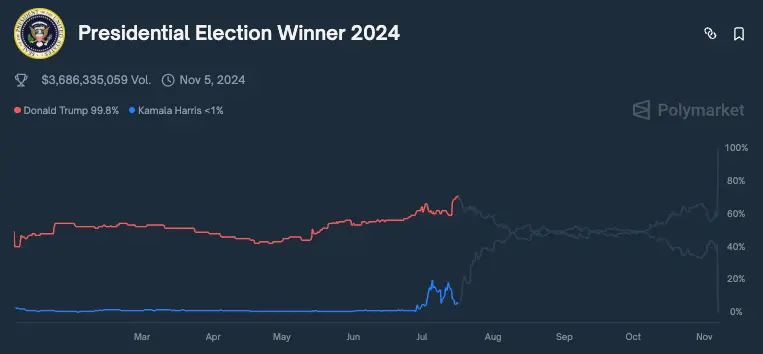
Over 3.6 billions USD bet on the 2024 US presidential election on Polymarket | Source: Polymarket
On January 20, 2025, Trump was sworn in and returned to the White House. Six months later, the US Department of Justice announced the end of its investigation into Polymarket, with no charges filed and no results announced.
Now, Polymarket is preparing to return to the US market at the end of November, focusing on sports betting business.
From the raid to the withdrawal of the investigation, it took only seven months, and the entire situation was completely reversed before and after Trump's return to the White House. Crypto entrepreneur Zach Hamilton put it more bluntly: "If you want to explain why prediction markets can re-enter the US, you only need one name—Donald Trump."
Almost at the same time, Donald Trump Jr.'s personal trajectory also overlapped with this turning point.
On January 20, the day his father returned to the White House, he announced he was joining the regulated prediction platform Kalshi as a strategic advisor. In August, just as the Justice Department's investigation was settled, his 1789 Capital led a new round of financing for Polymarket, and he himself joined the advisory board.
Behind this revelry is the regulators' lack of capacity.
The CFTC is a nearly fifty-year-old federal agency, originally responsible for regulating bulk commodity futures such as corn and beef. Now, it must also face the rapidly expanding crypto derivatives and prediction markets. The agency's annual budget is less than 400 millions USD, with fewer than 700 employees. In contrast, the SEC, which oversees the securities market, has a budget of 2 billions USD and more than 4,000 employees.
A former CFTC official, speaking anonymously, admitted they are almost powerless to cope: "We simply do not have the capacity to regulate cryptocurrency or sports betting, let alone the combination of the two. The CFTC will be overwhelmed. You will see more and more insider trading appearing in prediction markets because we can't monitor it, and can only rely on whistleblowers and self-reporting."
Regulation that relies on whistleblowing and self-reporting is essentially no regulation at all.
Does Having Insider Information Count as Prediction?
The regulatory vacuum has turned prediction markets into a hunting ground where information advantages can be directly monetized.
On October 10, the day the Nobel Peace Prize was announced, Polymarket suddenly erupted in a globally watched insider trading controversy.
As early as three months prior, the platform had opened a prediction market for the "2025 Nobel Peace Prize winner," attracting over 20 millions USD in trading volume. Popular candidates included the widow of Russian opposition leader Navalny, US President Trump, environmental activist Greta Thunberg, and WikiLeaks founder Julian Assange.
By comparison, the odds for Maria Corina Machado, leader of Venezuela's Liberty Party, hovered between 3% and 5%, with almost no one betting on her.
However, just hours before the results were announced, Machado's odds suddenly soared from an unpopular low to over 70%. Data showed that at least three accounts placed large bets during the same period, with a single account betting tens of thousands of dollars. The precision of these trades was astonishing.
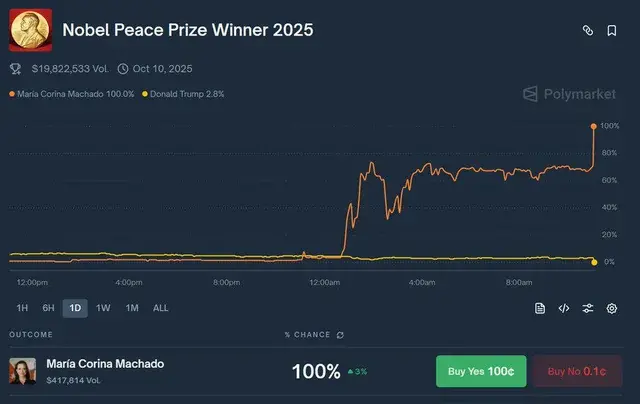
The Nobel Committee's final decision is usually made only a few hours before the award is announced, with very few insiders. Yet these accounts were able to place large bets hours in advance, and their odds curve almost perfectly predicted the final result.
Whether insider trading should be allowed in prediction markets has always been a focus of industry debate.
George Mason University economist and early prediction market advocate Robin Hanson believes that insider trading can actually improve market accuracy, as information is aggregated into prices more quickly: "If the goal of prediction markets is to obtain accurate information, then of course you want to allow insider trading."
This view sounds self-consistent, but ignores a more fundamental premise: when information advantages are overly concentrated in the hands of a few, and insider trading becomes the norm, ordinary traders will be quickly squeezed out of the market.
Without retail investors providing liquidity, the market will eventually shrink, becoming a place where only a few insiders compete with each other.Such a market is neither accurate nor fair, because it loses the foundation of "collective wisdom."
The regulatory vacuum makes this debate somewhat hollow.
Under the current system, the SEC's insider trading regulations do not apply to prediction markets, as these trades are based on "events" rather than "securities." The other regulatory agency, the CFTC, has yet to issue a clear ban on insider trading.
The original intention of prediction markets is to use prices to measure the probability of future events. But now, it is more like a game of information: whoever has more insider information can turn the future into profit in advance.
The $500,000 Admission Ticket
And if information can be priced, then in Donald Trump Jr.'s new business, power has a more direct price tag.
In April 2025, Donald Trump Jr. and his venture capital firm 1789 Capital founded a private members-only club, Executive Branch, in Georgetown, Washington, D.C. The membership fee is $500,000, with an annual fee of $25,000. Even so, within less than two months of its founding, the club already had a long waiting list.
The club's founding member list is almost a condensed map of the power structure.
The White House's "crypto czar" David Sacks, Gemini exchange founders the Winklevoss twins, and tech investor Chamath Palihapitiya are all among them.
Even more noteworthy is the collective presence of senior government officials.
At the Executive Branch launch party, at least six cabinet-level officials from the Trump administration were present, including Secretary of State Marco Rubio, Attorney General Pam Bondi, SEC Chairman Paul Atkins, FTC Chairman Andrew Ferguson, FCC Chairman Brendan Carr, and Director of National Intelligence Tulsi Gabbard.
In addition, FBI Deputy Director Dan Bongino was also present, toasting with several Silicon Valley CEOs and founders.
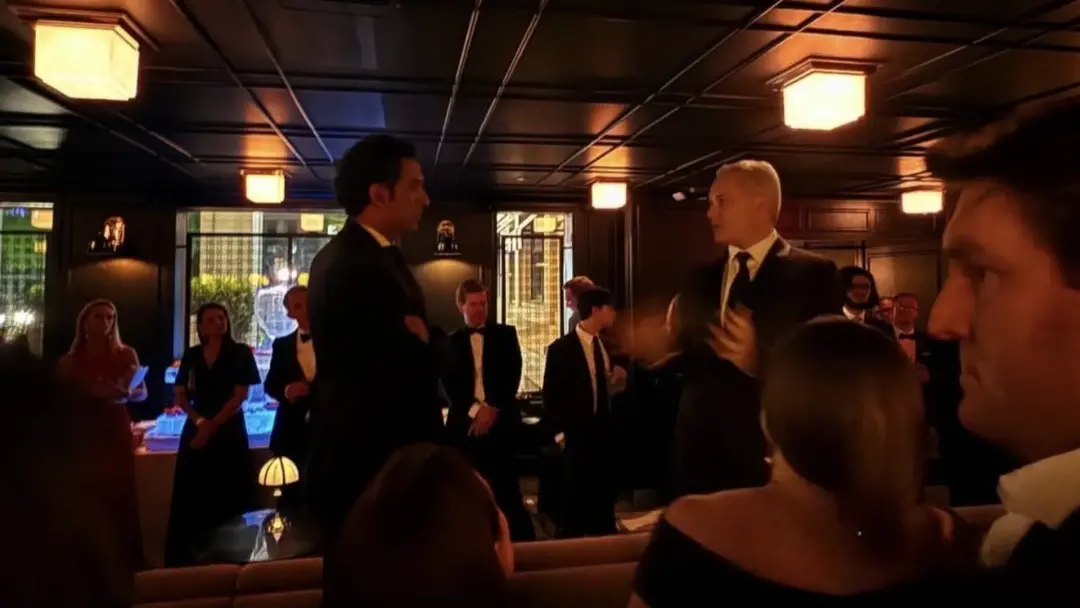
Party scene | Source: Axios
An insider at the club later revealed in an interview that they deliberately refused media and lobbyists, hoping to allow people to converse freely in an "absolutely private" environment.
The value of this so-called "private conversation" lies precisely in its ability to systematically bypass existing political oversight frameworks.
According to the US Lobbying Disclosure Act, lobbying activities must publicly record the target, topics, and expenditures, but the closed-door meetings of the Executive Branch club are clearly not within the scope of disclosure. Likewise, it is not subject to the Federal Advisory Committee Act.
In other words, that $500,000 admission ticket is not just an ordinary ticket, but a pass that leads directly to the core of power, bypassing institutional scrutiny.
This model is reminiscent of the Trump International Hotel in Washington during Trump's first presidential term.
That gold-faced building almost became a transit station for power at the time.
Government officials, Republican lawmakers, foreign dignitaries, and business leaders frequented the place, where casual conversations over drinks were often more effective than meetings. According to The Washington Post, during Trump's term, officials from at least 22 foreign governments stayed at the hotel, and Trump himself was accused of violating the US Constitution's "Emoluments Clause" as a result.
But unlike that hotel, the Executive Branch club is more secretive, more expensive, and more exclusive. The Trump hotel was at least a semi-public commercial venue, where guests could still be spotted by the media. At Executive Branch, all meetings, conversations, and transactions take place under the protection of "privacy."
When 1789 Capital is both an investor in Polymarket and Donald Trump Jr. is both the founder of this club and an advisor to Polymarket, a closed-loop network of interests is beginning to take shape.
Even more subtly, the club's membership list includes both regulators such as the SEC chairman and attorney general, as well as investors and executives from prediction market platforms. When regulators and the regulated, investors and the invested, sit at the same table, the so-called "boundaries" become meaningless.
Jeff Hauser, executive director of the Revolving Door Project, an organization dedicated to monitoring appointments and conduct of US executive branch officials, publicly questioned this.
He pointed out that Polymarket itself is already a politically controversial entity, and the Trump family's dual role can both influence regulatory direction and benefit from regulatory relaxation, blurring the line between power and capital. This overlapping relationship is a typical and strictly avoidable "conflict of interest."
In response to outside doubts, White House Press Secretary Karoline Leavitt replied that the president and his family "have never, and will never, be involved in any conflict of interest."
The No Longer Unknown Future
The theoretical foundation of prediction markets can be traced back to Nobel laureate Friedrich Hayek's theory of "dispersed knowledge."
Hayek believed that prices are not only the result of transactions, but also a social signal that can aggregate fragmented and local knowledge dispersed among countless individuals into an overall information system.
Prediction markets are an extension of this idea. By allowing people to bet real money on the future, they attempt to condense the judgments and beliefs scattered among the crowd into a probability expressed by price.
But Hayek's theory has a premise that is often overlooked. The market can aggregate knowledge because information is relatively dispersed among participants.
When a few people hold overwhelming information advantages, prices no longer represent collective wisdom, but merely reflect the flow of power and resources. At that point, the market degenerates from a knowledge aggregator to a tool for wealth transfer.
The precise bet placed before the Nobel Prize announcement did not prove market efficiency, but rather reminded people thatso-called market rationality is sometimes just an illusion of information controlled by a few.
The core promise of prediction markets is to turn an uncertain future into a tradable asset. This promise is based on a fundamental assumption: the future is unknown, and all participants are using their partial information to guess the direction of the future.
But for those who truly hold power, the future is, to a large extent, not unknown. For them, so-called "prediction" has never been about "guessing the unknown future."
When the attorney general can decide whether to prosecute Polymarket, the SEC chairman can redraw the regulatory boundaries of the entire industry, and the family members of these decision-makers are deeply involved and directly hold investment interests in this market, what they are trading is no longer an uncertain future, but "certainty" itself as defined by their own power.
The launch of Truth Predict pushes this logic to the extreme. When the platform operator and their family members themselves have the ability to influence the outcome of these events, the word "prediction" loses its meaning—it no longer points to the uncertainty of the future, but merely to the advance pricing of outcomes by power.
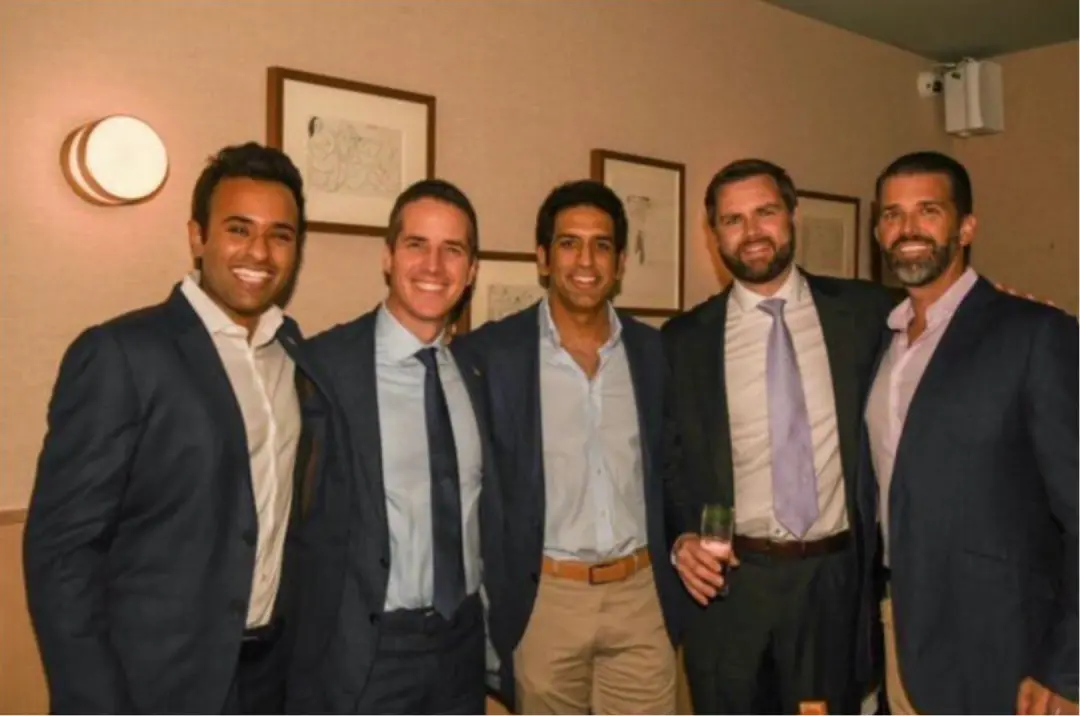
From left to right: Vivek Ramaswamy, Ohio Senator Bernie Moreno (Republican), Omeed Malik, Vice President J.D. Vance, and Donald Trump Jr. | Source: POLITICO
Blockchain technology can record all transactions on a public ledger, seemingly allowing everyone to trace every bet. But this transparency is limited to wallet addresses, not the identities of those behind the scenes.
No one knows who placed the precise bets on Polymarket hours before the Nobel Prize announcement, nor who opened precise positions on HyperLiquid before policy releases.
In the future, when the same logic is replicated on Truth Predict, when a platform directly or indirectly controlled by the president's family allows people to bet on elections, interest rates, and wars, transaction transparency will no longer matter. What truly matters is who can know the results in advance, or even make the results happen according to their own will.
And these answers probably exist only in the corner of the Executive Branch club, guarded by "privacy."
Disclaimer: The content of this article solely reflects the author's opinion and does not represent the platform in any capacity. This article is not intended to serve as a reference for making investment decisions.
You may also like
YouBallin: Reshaping the Reputation System of Decentralized Creator Platforms
The decentralized creator economy platform YouBallin has officially launched globally. The platform is built on the high-performance blockchain Solana, ...

Discussion on MSTR's Q3 2025 Financial Report
MSTR can purchase up to $42.1 billion worth of Bitcoin.
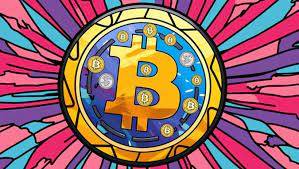
Fed turns hawkish? Barclays: Powell aims to "break the expectation of inevitable rate cuts," and data supports more rate cuts
Barclays believes that the market's hawkish interpretation of Powell's remarks is a misjudgment.

NEO ignites the robotics sector—what Robotic projects are worth paying attention to?
An overview of projects related to the Robotics sector.
